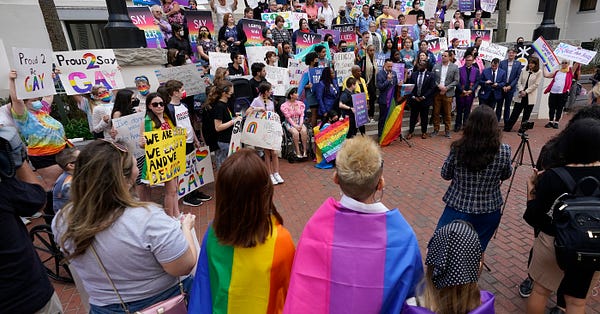If you’ve valued reading The Signorile Report, consider becoming a paid subscriber and supporting independent, ad-free opinion journalism. Thanks!
A caller to my SiriusXM show, Kevin from Long Island, New York, argued that I wasn’t telling the truth when I said a teacher couldn’t discuss his husband, or a student, couldn’t talk about being “gay” or “trans” under Florida’s and other states’ “don’t say gay” bills.


This is a major talking of those who promote the bills — and they’re lying because they want to have it both ways and confuse people. Kevin might be the kind of person they’re trying to confuse. He claimed he is not in favor of the bill, and “disagrees” with it, and that it’s an example the “government imposing on teachers.”
He then claimed that, nonetheless, he read the bill and that wouldn’t prohibit a student, for example, to say he has two gay fathers, an example I’d used on the show.
But this is just parroting the claims by the sponsors of the bill who say it wasn’t about that, and that the bill reads there should be no “instruction” about sexual orientation or gender identity. That term “instruction” makes it sound like the bill is only banning discussion of sexual activity.
But in fact, when one Republican in the Florida legislature tried to change the bill to simply prohibit discussion of of sexual activity, the sponsors opposed it:
In Florida, State Senator Jeff Brandes of St. Petersburg thought he had found a compromise: He tried to amend the education-related legislation to effectively ban sex education through third grade without singling out L.G.B.T.Q. people. When Republicans voted down the amendment, Mr. Brandes said, he became convinced that the legislation was meant to “impact” the L.G.B.T.Q. community and create a political wedge.
The bill is not only purposely vaguely worded in the body of the bill, but it’s specifically worded in the preamble to ban “discussion” of sexual orientation and gender identity — which would clearly ban talking about being gay or trans or talking about family members who are. Surely no teacher is going to take a chance when the bill allows for lawsuits if parents believe they’ve crossed the line:
In its preamble, the bill’s authors write that their aim is to prohibit “classroom discussion about sexual orientation or gender identity.” But later, the actual bill states that “classroom instruction by school personnel or third parties on sexual orientation or gender identity may not occur”….
…”Well, what’s the scope of that term called ‘instruction?’” [University of Miami Law School Professor [Charlton] Copeland said. “And the preamble seems to have a conception of what is prohibited that is much broader when we might think of a cramped conception of ‘instruction.’”
When I tried to explain this to Kevin from Long Island, he seemed adamant that I was wrong. And then he said he was opposed to teaching “partisan” ideas to students, which I took as an insult — and told him so — since being gay or trans isn’t “partisan.”
That made me believe he wasn’t really someone who is opposed to the bill, and I told him I thought he was spouting bullshit. But whatever the case, this is the confusion that proponents are trying to create, sucking people in on their “parents rights” ruse.
Listen in and let me know your thoughts.














What do the "don't say gay" laws actually say?